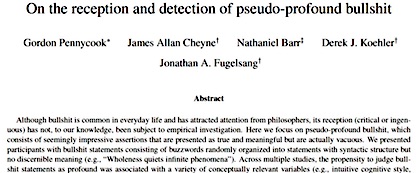Bullshit and academia continue their delighted dance. Behold a new study:
“On the Reception and Detection of Pseudo-Profound Bullshit,” Gordon Pennycook [pictured here], James Allan Cheyne, Nathaniel Barr, Derek J. Koehler, and Jonathan A. Fugelsang, Judgment and Decision Making, Vol. 10, No. 6, November 2015, pp. 549–563. The authors, at the University of Waterloo, explain:
‘Although bullshit is common in everyday life and has attracted attention from
philosophers, its reception (critical or ingenuous) has not, to our knowledge, been subject to empirical investigation. Here we focus on pseudo-profound bullshit, which consists of seemingly impressive assertions that are presented as true and meaningful but are actually vacuous. We presented participants with bullshit statements consisting of buzzwords randomly organized into statements with syntactic structure but no discernible meaning (e.g., “Wholeness quiets infinite phenomena”). Across multiple studies, the propensity to judge bullshit statements as profound was associated with a variety of conceptually relevant variables (e.g., intuitive cognitive style, supernatural belief). Parallel associations were less evident among profundity judgments for more conventionally profound (e.g., “A wet person does not fear the rain”) or mundane (e.g., “Newborn babies require constant attention”) statements. These results support the idea that some people are more receptive to this type of bullshit and that detecting it is not merely a matter of indiscriminate skepticism but rather a discernment of deceptive vagueness in otherwise impressive sounding claims.’
BONUS: Emily Willingham explores (in an essay for Forbes magazine) the cameo role played by 1998 Ig Nobel Prize physics prize winner Deepak Chopra in this study. (Thanks to Karen Weintraub for bringing this essay to our attention.)
BONUS: Social Media and Bullshit
